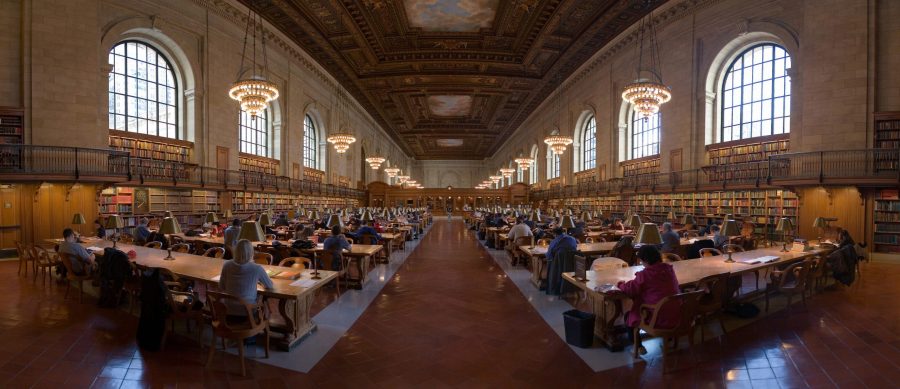Americans Visited Libraries Almost Twice as Often as They Went to the Movies Last Year, a New Survey Shows

Image via Wikimedia Commons
One recurring story over the past year, covered by every major news outlet, asks whether streaming services are “killing” movie theaters (or if they are killing themselves). Another looks into the trend of binge-watching, and the effect of an entertainment ecosystem built on shows that seem to stream themselves. Given the ubiquity of this kind of coverage, we might be forgiven for suspecting that the U.S. is turning into a mass of passive home viewers transfixed by supernatural thrillers, dark comedies, reality TV, teen dramas, etc.….
This isn’t entirely the case.... While others tally up the number of eyeballs on variously-sized screens, veteran polling outfit Gallup spent part of December 2019 asking Americans around the country what they did when they went out. Among the nine activities they listed—including movies, concerts, sporting events, museums, zoos, and casinos—“visiting the library remains the most common cultural activity Americans engage in, by far,” averaging 10.5 visits per year, notes Justin McCarthy at Gallup News.
To put that “by far” into perspective, those polled reported, on average, going to the library almost twice as often as going to the movies, the second-place activity, over the past year. But as with all such polling data, we should not draw hasty conclusions without looking at specifics. Gallup breaks down the demographics by gender, age, income, region, and by households with and without children. Surprisingly, they found very little difference between the latter two groups’ reported library trips.
Among the other categories, we find that women reported going to libraries almost twice as often as men; that people between 18-29 report going over twice as often as those between 50-64—perhaps due to college assignments; and that low income households report going at much higher rates than those in higher brackets. “Cost seems to be a factor driving these trends,” writes Brigit Katz at Smithsonian. “Visiting the library is free, as are the variety of services libraries offer, including Wi-Fi.”
Indeed, “29 percent of library-going Americans over the age of 16 went to use computers, the internet or a public Wi-Fi network.” Libraries are places to gain access to cultural experiences that can be cost-prohibitive elsewhere: to take free classes and enjoy free movies, music, and, yes, books. The number of average visits has remained unchanged since a similar poll in 2001, “suggesting libraries are as popular now as they were at the turn of the millennium.” Trips to the movies, on the other hand, are down an average of 1.3 visits.
Make of the data what you will in the full breakdown at Gallup News. The telephone survey has a very small sample size—1,024 adults in all 50 states—which may not be at all representative of the whole. Nonetheless, McCarthy concludes that “despite the proliferation of digital-based activities over the past two decades… libraries have endured.” May they continue to do so, and to serve the needs of all Americans, especially those who might otherwise have little access to the kinds of knowledge, information, and culture that libraries steward.
via Smithsonian
Related Content:
The New York Public Library Announces the Top 10 Checked-Out Books of All Time
Free Coloring Books from World-Class Libraries & Museums: Download & Color Hundreds of Free Images
Josh Jones is a writer and musician based in Durham, NC. Follow him at @jdmagness.
Americans Visited Libraries Almost Twice as Often as They Went to the Movies Last Year, a New Survey Shows is a post from: Open Culture. Follow us on Facebook, Twitter, and Google Plus, or get our Daily Email. And don't miss our big collections of Free Online Courses, Free Online Movies, Free eBooks, Free Audio Books, Free Foreign Language Lessons, and MOOCs.
from Open Culture https://ift.tt/2Imb2vX
via Ilumina
Comments
Post a Comment